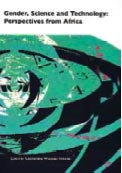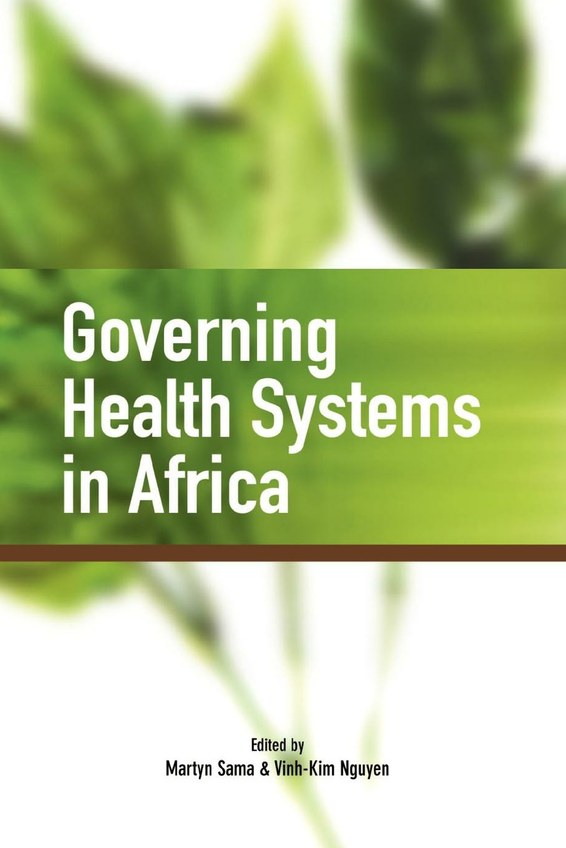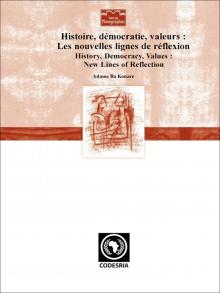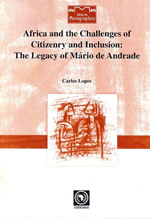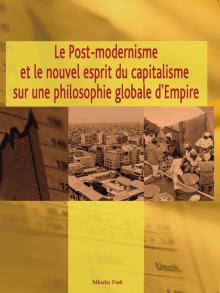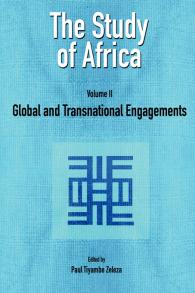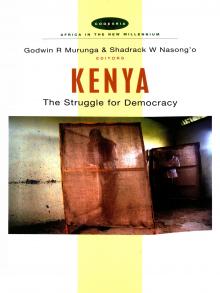Gender, Science and Technology: Perspectives from Africa (Printed)
Gender, Science and Technology: Perspectives from Africa (Printed)
This sixth volume of the CODESRIA Gender Series is a collection of discourses, perspectives, practices and policies on the role of the female gender in science and technology, particularly in the African context. Although widely advocated as the indisputable foundation for political and economic power in the modern world, science and technology remains marked by various layers and dimensions of gender inequality that work to the disadvantage of girls and women. Despite the fact that a lot of awareness has been created, and gender issues are now more readily acknowledged by various development initiatives in Africa, participation in science and technology still remains a hurdle as far as girls and women are concerned. A common theme that runs through the book is how feminine identities, ideologies of domesticity and gender stereotypes, and the inadequacy or lack of clear policies facilitate the invisibility of women in science and technology. This notwithstanding, women have never ceased devising clever and ingenious ways that would enable them to master nature, from the margins. The book provides a window onto the current state of female participation in science and technology in Africa, along with an analysis of the historical backgrounds, current educational and professional contexts, and prospects for the future. While it is evident that more research needs to be done, with more groups in different regions, this volume brings together a rich and inspiring collection of qualitative insights on gender, science and technology in Africa. The CODESRIA Gender Series acknowledges the need to challenge the masculinities underpinning the structures of repression that target women. The series aims to keep alive and nourish African social science research with insightful research and debates that challenge conventional wisdom, structures and ideologies that are narrowly informed by caricatures of gender realities. It strives to showcase the best in African gender research and provide a platform for emerging new talents to flower.
Governing Health Systems in Africa (Printed)
Governing Health Systems in Africa (Printed)
Drawing on various disciplinary perspectives, this book re-focuses the debate on what makes a good health system, with a view to clarifying the uses of social science research in thinking about health care issues in Africa. The explosion of the HIV/AIDS pandemic, the persistence of malaria as a major killer, and the resurgence of diseases like tuberculosis which were previously under control, have brought about changes in the health system, with implications for its governance, especially in view of the diminished capacity of the public health facilities to cope with a complex range of expanded needs. Government responsibilities and objectives in the health sector have been redefined, with private sector entities (both for profit and not-for profit) playing an increasingly visible role in health care provisions. The reasons for collaborative patterns vary, but chronic under-funding of publicly financed health services is often an important factor. Processes of decentralisation and health sector reforms have had mixed effects on health care system performance; while private health insurance markets and private clinics are pointers to a growing stratification of the health market, in line with the intensified income and social differentiation that has occurred over the last two decades.These developments call for health sector reforms.
Histoire, démocratie, valeurs : nouvelles pistes de réflexion (Printed)
Histoire, démocratie, valeurs : nouvelles pistes de réflexion (Printed)
Jetant son coup d’oeil d’historienne sur la démocratie et ses valeurs, Adame Ba Konaré a fait le discours de Léopold Sedar Senghor lors de la 11ème Assemblée Générale du CODESRIA à Maputo en Décembre 2005. Konaré a appelé à l’enracinement de la démocratie dans une Afrique où les citoyens sont libres de participer à part entière au processus de prise de décisions qui répondent à l’intérêt général; ceci d’une manière qui ne constituerait pas une simple imitation de notions inoculées de l’extérieur ou qui refléterait sans questionnement le désir des Chefs d’État. Selon Konaré, pour que les citoyens puissent jouir pleinement de la démocratie dans l’humilité et le respect mutuel, il leur faudra le droit à la liberté d’association et de mobilisation dans l’intérêt de tous et en parfaite harmonie avec les valeurs africaines qui ont su résister au temps.
History, Democracy, Values: New Lines of Reflection (Printed)
History, Democracy, Values: New Lines of Reflection (Printed)
At the 11th General Assembly of CODESRIA, which was held in Maputo in December 2005, Adame Ba Konaré presented the Leopold Sedar Senghor Lecture, casting her historian eye on democracy and its values. Konaré calls for the enshrinement of democracy in Africa, where citizens are free to participate responsibly in decision-making on matters of common interest, and in ways that simply do not mimic externally induced notions or reflect unquestioningly the will of Heads of State.
L’Afrique face aux enjeux de la citoyenneté et de l’inclusion: l’héritage de Mario de Andrade (Printed)
L’Afrique face aux enjeux de la citoyenneté et de l’inclusion: l’héritage de Mario de Andrade
A la 11ème Assemblée générale du CODESRIA qui s’est tenue à Maputo en décembre 2005, Carlos Lopes a prononcé le Discours Cheikh Anta Diop sur ‘L’Afrique face aux enjeux de la citoyenneté et de l’inclusion : l’héritage de Mário de Andrade’ de l’Angola. Il examine la vie et l’époque de Mário Andrade, le nationalisme africain et ses propositions révolutionnaires en plus des triomphes et vicissitudes de la négritude et du panafricanisme. Il analyse les conséquences pour les citoyens de ces pays, l’inclusion et le respect pour les identités. Il conclue son intervention par leurs implications de tous ces facteurs pour les intellectuels africains. A l’instar de Mario de Andrade qui détestait les rites associés au pouvoir et qui avait honte des notions de citoyenneté exclusivistes. Lopes fait une critique sur le nationalisme étroit qui met en danger le panafricanisme. Il fait appel aux intellectuels africains pour la dénonciation de ces pratiques dans l’intérêt des droits universels basés sur le principe que le développement amène plus d’opportunités et de liberté de choix.
L’industrie musicale au Sénégal : Essai d’analyse (printed)
L’industrie musicale au Sénégal : Essai d’analyse (Printed)
Des logiques d’actions plurielles et différentes dimensions sous-tendent la construction du fait musical au Sénégal, produite par plusieurs pôles d’acteurs interagissant entre des structures contraignantes et une relative autonomie. Dans une industrie musicale marquée par de profondes mutations socioculturelles et socioéconomiques, « informel de la musique » et processus de « formalisation » cohabitent de manière problématique. L’industrie musicale, en expansion, est dès lors appelée à s’organiser selon un cadre véritablement formel. La question des droits d’auteur à travers les règles de rémunération et leur application est alors instamment posée. Parallèlement, la politique culturelle de l’Etat, ainsi que les liens, selon diverses modalités, entre champ musical et politique, sont passés en revue. Cet essai tente de poser un certain nombre de questions et se présente en définitive comme une invite à la réflexion et à l’action.
Le post modernisme et le nouvel esprit du capitalisme sur une philosophie globale d’Empire (printed)
Le post modernisme et le nouvel esprit du capitalisme sur une philosophie globale d’Empire (printed)
L’idée de ce livre est née d’une controverse avec une certaine jeunesse africaine fascinée par la civilisation du virtuel. L’auteur a voulu ici faire douter cette génération en mettant en évidence les desseins secrets du postmodernisme qu’il décrit comme une idéologie de la mondialisation ou du libre jeu des marchés. Le livre montre que l’ère postmoderne continue et accomplit l’époque structurale, et qu’à ce titre, il constitue une philosophie des contraintes. Tous affichent leurs desseins totalitaires, tout en feignant de critiquer l’idée de totalité. Détruisant le mythe universaliste qui accompagne la postmodernité, le livre se prononce en faveur d’un universalisme démocratique, fondé sur la réhabilitation de la valeur d’usage. Il se conclut par une réflexion générale sur le problème de la faillite de la modernité, que ce livre situe au niveau de la contradiction entre la modernité économique et la modernité sociale; le refus de cette dernière expliquant les nostalgies anti et pré-modernes d’une doctrine conservatrice au service de la polarisation du monde.
African Anthropologies: History, Critique and Practice (Printed)
African Anthropologies: History, Critique and Practice (Printed)
This overview of the history, application and teaching of anthropology in post-colonial Africa shows how the continent’s anthropologists are redefining the historical legacy of European and American disciplinary hegemony, and developing distinctively African contributions to anthropological theory and practice. The contributors illustrate the diverse national traditions of anthropological practice that have developed in sub-Saharan Africa since decolonisation and exemplify the diversity of professional work carried out by the discipline’s practitioners. Their commitment to a common disciplinary identity demonstrates the place that exists for a critical anthropology that is reflective about both its potentials and limitations.
The Study of Africa, Volume 2: Global and Transnational Engagements (Printed)
The Study of Africa, Volume 2: Global and Transnational Engagements
This is the second of a two-volume work taking stock of the study of Africa in the twenty-first century: its status, research agenda and approaches, and place. It is divided into two parts, the first entitled Globalisation Studies and African Studies, and the second, African Studies in Regional Contexts. Topics addressed in part one include: trans-boundary formations and the study of Africa; global economic liberalisation and development in Africa; African diasporas, academics and the struggle for a global epistemic presence; and the problem of translation in African studies. Part two considers: African and area studies in France, the US, the UK, Australia, Germany and Sweden; anti-colonialism and Russian/soviet African studies; African studies in the Carib bean in historical perspective; the teaching of African history and the history of Africa in Brazil; African studies in India; African studies and historiography in China in the twenty-first century; and African studies and contemporary scholarship in Japan.
The Study of Africa, Volume 1: Disciplinary and Interdisciplinary Encounters (Printed)
The Study of Africa, Volume 1: Disciplinary and Interdisciplinary Encounters (Printed)
This is the first of a two-volume work which takes stock of the study of Africa in the twenty-first century: its status, research agenda and approaches, and place. It is divided into two parts, the first on the academic disciplines and African Studies, the second on interdisciplinary studies.
Topics addressed in part one include: anthropology, race, ethnography and sociology in relation to area studies; African historiography, and the research and teaching of history in Africa in an era of institutional crisis and ‘global history’; and the need to rethink Africanist political sciences.
Scholars in the Market Place : The Dilemmas of Neo-Liberal Reform at Makerere University, 1989-2005 (Printed)
Scholars in the Market Place : The Dilemmas of Neo-Liberal Reform at Makerere University, 1989-2005 (Printed)
Scholars in the Marketplace is a case study of market-based reforms at Uganda’s Makerere University. With the World Bank heralding neoliberal reform at Makerere as the model for the transformation of higher education in Africa, it has implications for the whole continent. At the global level, the Makerere case exemplifies the fate of public universities in a market-oriented and capital friendly era. The Makerere reform began in the 1990s and was based on the premise that higher education is more of a private than a public good. Instead of pitting the public against the private, and the state against the market, this book shifts the terms of the debate toward a third alternative than explores different relations between the two. The book distinguishes between privatisation and commercialisation, two processes that drove the Makerere reform. It argues that whereas privatisation (the entry of privately sponsored students) is compatible with a public university where priorities are publicly set, commercialisation (financial and administrative autonomy for each faculty to design a market-responsive curriculum) inevitably leads to a market determination of priorities in a public university. The book warns against commercialisation of public universities as the subversion of public institutions for private purposes.
Kenya: The Struggle for Democracy (Printed)
Kenya: The Struggle for Democracy (Printed)
« Riveting, compelling, engaging and inspiring… Not only is Kenya : The Struggle for Democracy a book of first-rate scholarship, it is an informative and readable treatise on the everyday expressions of Kenyan citizens’ intense passion for openness, justice and responsible governance ». Lisa Aubrey, Ohio University « A very refreshing, rigorous, informative and multidisciplinary analysis of Kenya’s transition to democratic governance, Kenya : The Struggle for Democracy not only identifies the reasons behind Kenya’s failure to institutionalise democracy, but it also provides possible solutions ». John Mukum Mbaku, Willard L. Eccles Professor of Economics and John S. Hinckley Fellow, Weber State University « A moving and comprehensive analysis of institutions and actors that have shaped Kenya’s future… For Africanists, this is compulsory reading which requires a response ». Winnie Mitullah, University of Nairobi.


